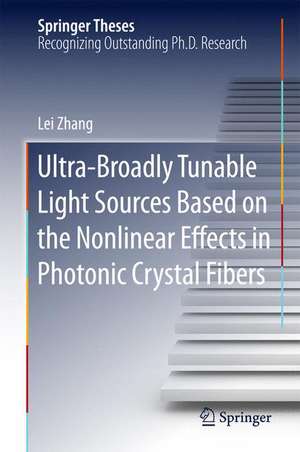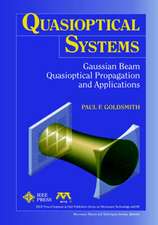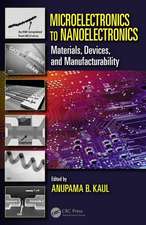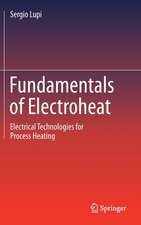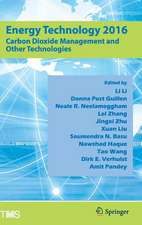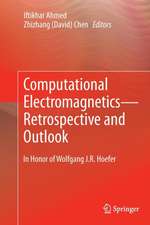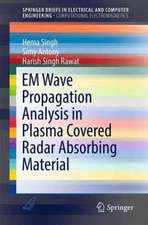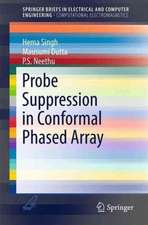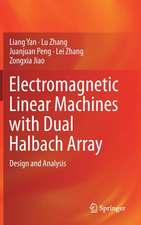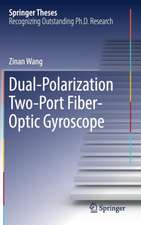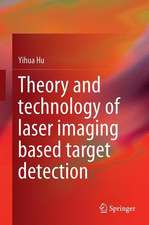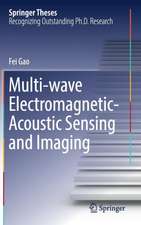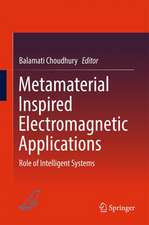Ultra-Broadly Tunable Light Sources Based on the Nonlinear Effects in Photonic Crystal Fibers: Springer Theses
Autor Lei Zhangen Limba Engleză Hardback – 23 oct 2015
| Toate formatele și edițiile | Preț | Express |
|---|---|---|
| Paperback (1) | 377.35 lei 43-57 zile | |
| Springer Berlin, Heidelberg – 23 aug 2016 | 377.35 lei 43-57 zile | |
| Hardback (1) | 384.70 lei 43-57 zile | |
| Springer Berlin, Heidelberg – 23 oct 2015 | 384.70 lei 43-57 zile |
Din seria Springer Theses
- 18%
 Preț: 997.88 lei
Preț: 997.88 lei -
 Preț: 389.88 lei
Preț: 389.88 lei - 15%
 Preț: 646.94 lei
Preț: 646.94 lei - 18%
 Preț: 943.43 lei
Preț: 943.43 lei -
 Preț: 399.29 lei
Preț: 399.29 lei - 18%
 Preț: 944.99 lei
Preț: 944.99 lei - 15%
 Preț: 636.80 lei
Preț: 636.80 lei - 18%
 Preț: 941.05 lei
Preț: 941.05 lei - 15%
 Preț: 643.16 lei
Preț: 643.16 lei - 15%
 Preț: 642.68 lei
Preț: 642.68 lei - 18%
 Preț: 1103.62 lei
Preț: 1103.62 lei - 20%
 Preț: 558.82 lei
Preț: 558.82 lei - 18%
 Preț: 1112.30 lei
Preț: 1112.30 lei - 18%
 Preț: 944.19 lei
Preț: 944.19 lei - 18%
 Preț: 1109.92 lei
Preț: 1109.92 lei - 18%
 Preț: 1217.27 lei
Preț: 1217.27 lei - 15%
 Preț: 640.06 lei
Preț: 640.06 lei - 15%
 Preț: 636.45 lei
Preț: 636.45 lei - 15%
 Preț: 640.06 lei
Preț: 640.06 lei - 15%
 Preț: 640.88 lei
Preț: 640.88 lei -
 Preț: 389.70 lei
Preț: 389.70 lei - 20%
 Preț: 563.89 lei
Preț: 563.89 lei -
 Preț: 393.35 lei
Preț: 393.35 lei - 15%
 Preț: 637.93 lei
Preț: 637.93 lei - 15%
 Preț: 641.85 lei
Preț: 641.85 lei - 18%
 Preț: 1225.94 lei
Preț: 1225.94 lei - 20%
 Preț: 551.36 lei
Preț: 551.36 lei - 18%
 Preț: 1229.10 lei
Preț: 1229.10 lei - 15%
 Preț: 639.25 lei
Preț: 639.25 lei - 18%
 Preț: 999.45 lei
Preț: 999.45 lei - 15%
 Preț: 640.06 lei
Preț: 640.06 lei - 18%
 Preț: 1220.45 lei
Preț: 1220.45 lei - 18%
 Preț: 1116.26 lei
Preț: 1116.26 lei - 18%
 Preț: 1110.72 lei
Preț: 1110.72 lei - 18%
 Preț: 1000.87 lei
Preț: 1000.87 lei - 18%
 Preț: 891.17 lei
Preț: 891.17 lei - 15%
 Preț: 640.06 lei
Preț: 640.06 lei - 5%
 Preț: 1154.07 lei
Preț: 1154.07 lei - 15%
 Preț: 635.96 lei
Preț: 635.96 lei - 15%
 Preț: 640.88 lei
Preț: 640.88 lei -
 Preț: 387.20 lei
Preț: 387.20 lei - 18%
 Preț: 1109.92 lei
Preț: 1109.92 lei -
 Preț: 385.25 lei
Preț: 385.25 lei -
 Preț: 385.25 lei
Preț: 385.25 lei - 18%
 Preț: 1112.30 lei
Preț: 1112.30 lei - 18%
 Preț: 999.45 lei
Preț: 999.45 lei -
 Preț: 386.99 lei
Preț: 386.99 lei - 15%
 Preț: 637.13 lei
Preț: 637.13 lei - 20%
 Preț: 554.20 lei
Preț: 554.20 lei - 20%
 Preț: 555.57 lei
Preț: 555.57 lei
Preț: 384.70 lei
Nou
Puncte Express: 577
Preț estimativ în valută:
73.61€ • 77.06$ • 60.91£
73.61€ • 77.06$ • 60.91£
Carte tipărită la comandă
Livrare economică 07-21 aprilie
Preluare comenzi: 021 569.72.76
Specificații
ISBN-13: 9783662483596
ISBN-10: 3662483599
Pagini: 94
Ilustrații: XIV, 94 p.
Dimensiuni: 155 x 235 x 11 mm
Greutate: 0.34 kg
Ediția:1st ed. 2016
Editura: Springer Berlin, Heidelberg
Colecția Springer
Seria Springer Theses
Locul publicării:Berlin, Heidelberg, Germany
ISBN-10: 3662483599
Pagini: 94
Ilustrații: XIV, 94 p.
Dimensiuni: 155 x 235 x 11 mm
Greutate: 0.34 kg
Ediția:1st ed. 2016
Editura: Springer Berlin, Heidelberg
Colecția Springer
Seria Springer Theses
Locul publicării:Berlin, Heidelberg, Germany
Cuprins
Introduction.- New wavelength generation based on PCF with two zero dispersion wavelengths (TZDW).- PCF based optical parametric amplifier (OPA).- Widely tunable optical parametric oscillator (OPO) based on PCF.- PCF based OPO with high energy conversion efficiency.- Conclusion.
Textul de pe ultima copertă
This thesis examines laser generation from the ultraviolet to the short edge of the mid-infrared band by exploiting the nonlinear effects in photonic crystal fibers (PCFs). Several different physical mechanisms are investigated by using homemade PCFs with elaborately customized dispersion profiles. A particular focus is on the development of fiber optical parametric amplifiers (FOPAs) and oscillators (FOPOs) based on the PCFs with a zero-dispersion wavelength of ca. 1.06 μm. In particular, several schemes are proposed for solving the key problems involved in the application of FOPOs. These oscillators can be made more convenient to use by optimizing the wavelength-tuning mechanisms, and made more energy-efficient with the help of specially designed cavity structures. Today’s oscillators are more reliable, powerful and maneuverable than ever. This thesis provides a systematic road map in connection with the study of nonlinear wavelength generation in PCFs, from their fiber design and technical fabrication, to their physical mechanism and experimental investigation.
Caracteristici
Nominated by Tsinghua University as an outstanding PhD thesis Proposes a new method for simultaneously generating mid-infrared and visible dispersive waves Describes an optimized theory for evaluating the gain of fiber optical parametric amplifiers Optimizes the wavelength tuning of fiber optical parametric oscillators by employing a new technique Enhances the energy conversion efficiency by using two kinds of resonant cavity design Includes supplementary material: sn.pub/extras
